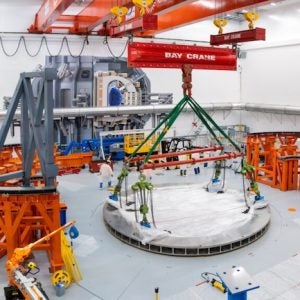 The UK will be the first European country to launch a high-assay low enriched uranium (HALEU) programme with a £300m ($381m) investment, according to a statement from the Department for Energy Security & Net Zero (DESNZ) and Claire Coutinho, Secretary of State for Energy Security & Net Zero.
The UK will be the first European country to launch a high-assay low enriched uranium (HALEU) programme with a £300m ($381m) investment, according to a statement from the Department for Energy Security & Net Zero (DESNZ) and Claire Coutinho, Secretary of State for Energy Security & Net Zero.
The programme will produce enriched uranium needed for next generation of reactors and provide jobs and investment in North West England and “will end Russia’s reign as the only commercial producer of HALEU,” the statement said.
The UK will become the first country in Europe to launch a high-tech HALEU nuclear fuel programme, strengthening supply for new nuclear projects and driving Putin further out of global energy markets.
The investment is part of plans to help deliver up to 24 GWe of clean, reliable nuclear power by 2050 – a quarter of the UK’s electricity needs. The launch of the HALEU programme “will enable the UK to supply the world with specialist nuclear fuel”.
An additional £10m will be provided to develop the skills and sites to produce other advanced nuclear fuels in the UK, “helping to secure long term domestic nuclear fuel supply and support international allies”.
Claire Coutinho said: “Britain gave the world its first operational nuclear power plant, and now we will be the first nation in Europe outside of Russia to produce advanced nuclear fuel. This will be critical for energy security at home and abroad and builds on Britain’s historic competitive advantages.”
Advanced modular reactors will play an important role in the UK’s nuclear revival. The statement noted adding that, like small modular reactors, they are smaller, can be made in factories, and could transform how power stations are built by making construction faster and less expensive. Many designs have the potential for a range of applications beyond low-carbon electricity generation, including production of hydrogen or industrial heat.
With the first HALEU plant scheduled to be operational in the early 2030s, the funding will boost the North West of England’s nuclear fuel production hub, supporting local industry and jobs “while helping to expand our nuclear revival in the UK and overseas”.
The statement concluded: “This builds on the UK’s work to displace Russia from the global nuclear fuels market, particularly in uranium conversion services, where government and industry are together investing up to £26 million to bring this capability back to the UK by the end of the decade.”
The US Department of Energy (DOE) is also investing heavily in HALEU development. In December, DOE issued a request for proposals (RFP) for deconversion services to help establish a reliable domestic supply of fuels for advanced reactors using high-assay low-enriched uranium (HALEU). DOE plans to award one or more contracts to deconvert HALEU as uranium hexafluoride gas to various chemical forms, such as metal or oxide, used to fabricate the fuels required by many advanced reactor developers. The deconversion contracts will last for up to 10 years, and the base awards guarantee a minimum of $2m to each recipient.
“Deconversion services are a key link in developing an advanced reactor fuel supply chain here in the United States,” said Dr Kathryn Huff, Assistant Secretary for Nuclear Energy. “We need these services urgently to enable advanced reactor deployments in support of our clean energy future.”
According to DOE, more than 40 tonnes of HALEU could be needed by 2030, with additional amounts required each year, to deploy a new fleet of advanced reactors in time to supports the Administration’s goal of 100% clean electricity by 2035. The 2020 Energy Act authorises DOE to establish and carry out a programme to support the availability of HALEU for civilian domestic research, development, demonstration, and commercial use. The Inflation Reduction Act of 2022 provided $700m to the HALEU availability programme.
Russia was hitherto the only supplier of HALEU to Europe and the USA before the imposition of sanctions in the wake of it special military operation in Ukraine in February 2022.






